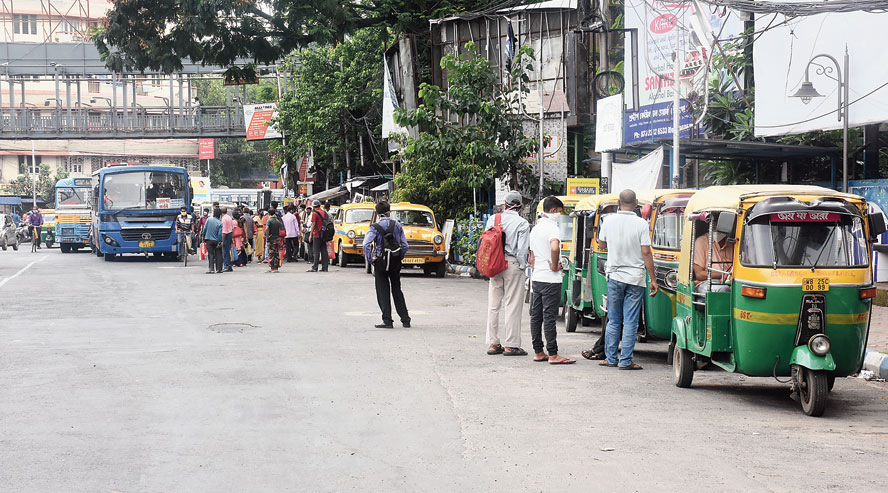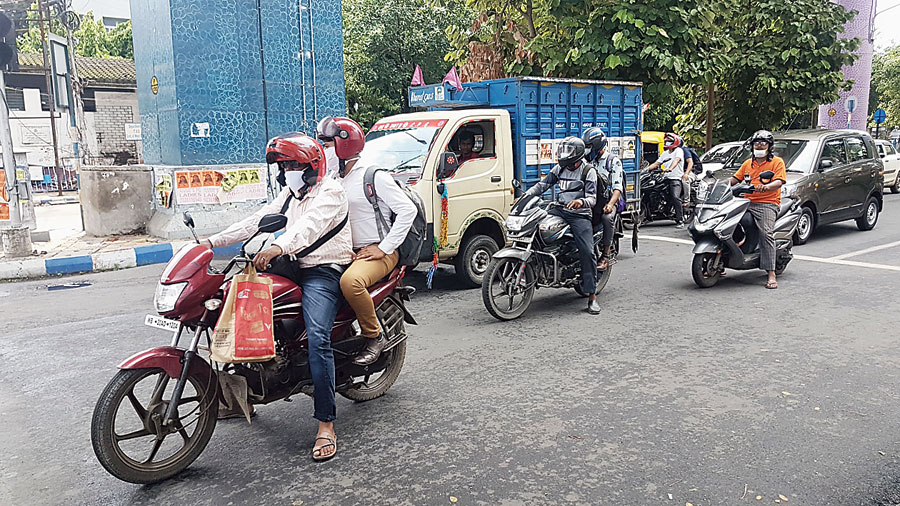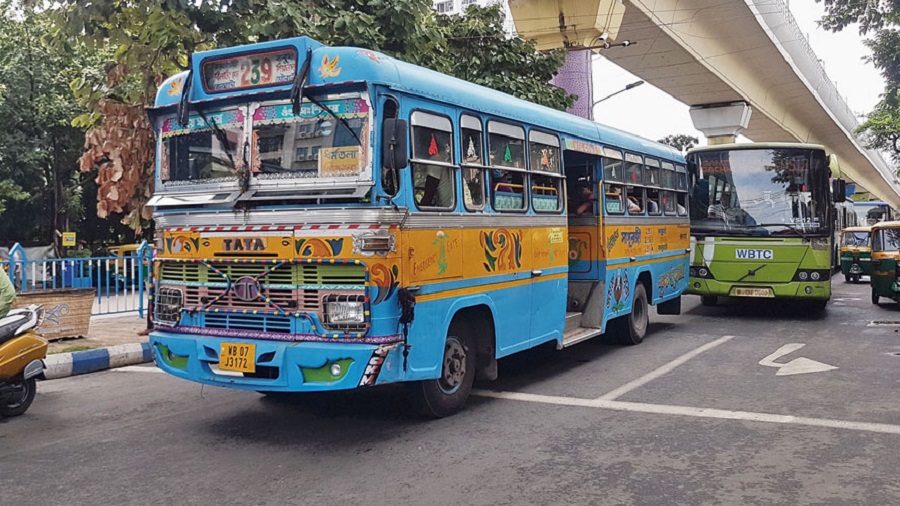Bus stops these days aren’t what they used to be. The crowd is gone. Commuters no longer spill on to the road or run behind buses. Auto drivers kill time sleeping in their vehicles in the absence of passengers and empty bus sheds are used by slum dwellers as spots to relax in.
On the other hand, commuters complain about the lack of public transport.
As offices reopen and employees head back to work, there has arisen a mismatch of demand and supply as far as public transport is concerned. Not everyone has their own vehicle and those dependent on autos and buses have social distancing to worry about.
War to get to office
Since his office reopened weeks ago, Karunamoyee’s Pradip Kumar Bhaduri has managed to reach work on time just once. “It’s so difficult reaching Park Street these days,” said Bhaduri, after 20 minutes of waiting at Karunamoyee bus stop on Monday. “There’s no direct bus and I have to make several break journeys.”
Meenakshi Thakur waited for a bus to Howrah for half an hour before booking an app cab. “It costs Rs 250 by cab and I can’t afford this every day,” she said. “They must increase the frequency of buses.”
BH Block’s Sumit Kedia has recently shifted from app cabs to shuttles to get to his Minto Park office. “The Metro used to be way more convenient,” he sighs. “Now I often get late. Thankfully my office is allowing half an hour grace period to walk in.”
Debjani Sengupta is too scared to use buses and shuttles, and is only riding rickshaws. “I take a rickshaw to Karunamoyee and a colleague gives me a lift to work from there,” says the Kestopur resident.
Slow business for buses
Bus routes like 215A and 201 used to be so crowded back in the day that one would be lucky to get a toehold during rush hour. “Now we don’t even have to ask people to maintain safe distance as even the seats are not filling,” says Sukumar Ghosh, who drives a private bus on the 201 route.
“Buses are dependent on trains for passengers. We used to get hoards of commuters from Bidhannagar and Belghoria railways stations but now we can barely cover our diesel costs. Our owners are unable to pay us in full,” he explains.
Only one-sixth of their fleet is on the street now and they have not increased fares. The once popular DN8 bus route has stopped entering Salt Lake altogether and make a turn from Ultadanga itself.
Several electric buses are running from Salt Lake and New Town to the rest of the city, allowing only 20 out of 43 seats to be occupied. New Town has three electric buses plying on three routes within the township. They bear a notice saying no more than 17 of their 32 seats can be occupied but even those are not filling up of late.
Long distance rides, like those to Asansol are down to 30 per cent occupancy. “We used to do 10 trips a day but are doing three now,” says Sudipto Ghosh of Shyamoli Paribhan, that sets off from Karunamoyee bus terminus.
Asish Jana has resumed his shuttle service from Sector V’s College More to Karunamoyee en route to Rabindra Sadan. “I have a 10-seater van but am only taking six passengers,” he says. “Actually, I can take six but am getting no more than four or five people now even after 10 minutes of waiting at the stands. Time was when commuters would yank open the door and enter the van before we even parked properly. Now I make a one-way trip in the morning and a return trip in the evening and call it a day.”

Commuters await public transportation at Ultadanga crossing during the morning office hour (Mayukh Sengupta)
Market down for autos
At Baisakhi auto stand, driver Pintu Saha dozes off waiting for passengers to show up in the afternoons. “This was unthinkable before the lockdown,” he says. “We are dependent on Sector V offices but with most of them asking employees to work from home, are left twiddle our thumbs.”
The stand used to have 25 autos each headed to Sector V and Karunamoyee but now there are barely 10. “We are taking two passengers instead of four and are asking them to pay double, for the missing passengers,” says Saha.
Pintu Bala, another driver, says most of them drive hired autos and have to pay Rs 300 a day to the owners. “We are barely earning that much from fares so most drivers have stopped coming reporting for work altogether,” he says.
The totos of New Town are suffering too. “A chunk of our passengers comprised students but with schools shut we are staring at empty streets,” says Santu Naskar, waiting outside CB Market. “We’re so desperate that we’re not even waiting for the totos to fill up. We are setting off with even a single passenger.”
The Big Bazaar at IB Block used to be a catchment area for rickshaws but now drivers are left high and dry. “Customers are opting for home deliveries so a scant few are coming to the supermarket. I’ve had an 80 per cent fall in passenger count,” laments Sanjoy Ghosh.
The totos outside Nazrul Tirtha blame offices for their plight. “Offices are sending cars to pick up and drop employees so we are redundant,” says driver Somnath Biswas. “We used to make Rs 800-900 a day and are now struggling to make Rs 250. How will we feed our families if we get one customer in two hours?”

Two-wheelers, like the ones seen at Karunamoyee, have become a favoured mode of transport (Brinda Sarkar)
Bikes in demand
Two-wheelers have become quite popular in the attempt to avoid public transportation.
Word has spread that New Town’s Archan Patranabish has a spare scooter and so suitors have mushroomed. “An acquaintance from Baisakhi has asked to buy it from me but I’m reluctant as the scooter’s insurance and fitness certificate have both expired,” says the man who lives near Pyecha More.
Santosh Kumar Ram, who is a staffer at Calcutta Medical College and Hospital, went ahead and bought a scooty two weeks ago. “The wait for the bus had become unending. Plus, being a hospital staff, I didn’t want to infect others by using public transportation,” says the resident of Baisakhi Abasan.
Tarak Das, who runs a pice hotel opposite DLF, has taken over his brother’s scooty as his own one will take a princely sum to repair.
Purushottam Auto, in EC Market, has been receiving numerous calls to fix old bikes post lockdown, “but we are unable to take up most of them as all but one of our mechanics refuse to return from the villages,” says Ashima Ghosh, the hassled owner.
The roadside garage next to AMRI Hospitals has been getting many bikes that were clearly neglected and out of use for long. “But owners are getting them repaired now, even if it costs a lot,” says a mechanic.
Then there’s Rapido, a bike taxi service commuters are opting for. “Previously our clients’ top destinations were Sector V and College Street but post lockdown colleges haven’t reopened and many offices are shut too. We have 40 per cent of our fleet on the street and are still assimilating data on top destinations,” says city head, Gaurav Pathak. Before being seated behind the bike rider, passengers have to sanitise their hands, wear a hair net and then the helmet. Their charges are Rs 19 for the first 3km.
RR Bike Rentals are giving bikes on rent. “At the beginning of the lockdown we had doctors and bankers hiring our bikes for a month and they have been extending the duration thereafter,” says Raghav Randar, who runs the service. “Post ‘unlock’, people who needed rides but didn’t have two-wheeler licences are preferring electric bikes. These have a top speed of under 35km/h and do not require licences to ride.”
An IT company is in talks with Randar for bulk orders too. “With cars, they can drop a maximum of three people now so the cost per head is high. It makes more sense to hire bikes,” he says. Their rates start from Rs 4,500 per month.
Orix Car Rentals have started offering cars on hire on a monthly basis too. “This scheme is becoming popular in the corporate circles as four or five colleagues are then sharing the car to come to work,” says a spokesperson of the Sector V office.
A traffic policeman at Baisakhi admitted to seeing more two-wheelers on the road now and added that many are flouting rules. “They think streets would be empty now and police would be lenient,” he says.
Amphan to the rescue
Car rentals have predictably taken a hit but they have had a mild silver lining. “Offices have been hiring cars to pick up employees from home but they are inconsistent these days. What suddenly made our cars high in demand was the cyclone,” says Pulak Chatterjee who runs a car rental service opposite CE Market. “Six to seven people have hired cars to go to the Sundarbans for relief work,” he says.
Vishvakarma Driver Service, that also provides cars, has had the same experience. “Big cars like Innovas are in demand as they can ferry lots of relief material,” says Gopal Yadav, from his BD Block office. “It’s just that post lockdown everyone is asking for heavy discounts which we are unable to give.”
Randar says a social group had booked their bikes during the lockdown to deliver essentials to senior citizens too.











